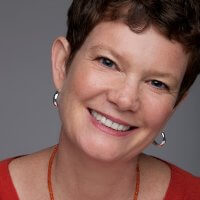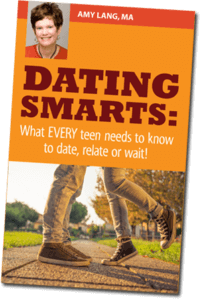In the adult world, dating is like an audition. An acquaintance asks you out to dinner or an event, which will give you time together to learn more about each other. Will you enjoy each other’s company? Will you have shared values and common ground? Will you want to spend even more time getting to know each other? Will there be “chemistry”? For many, the first date could mean: “I wonder if I want to have sex with you.” A hug and a sweet kiss afterward may be expected. And if both feel something, perhaps more!

Amy Lang, author of Dating Smarts
And now your child wants to date someone!
Your kid is growing up and needs to learn how to have fun while being responsible. Because of your own experiences with dating, you may have dark thoughts: foreplay, sex, unwanted pregnancy, and sexually transmitted infections!
Ack! It’s enough to give you the heebie-jeebies!
Dating should be fun, so how can you help your child create the best-case scenario, while avoiding the worst?
One dad I know greeted his daughter’s potential suitor by inviting the boy to sit with him on the front porch. “So you want to go out with my daughter,” he said. This was followed by questions about the boy’s intentions while he slowly whittled away on a wooden cylinder about the size of…well, you know.
I’ve always thought this story was hilarious, but of course it’s not the approved solution! The good news: childhood sexuality expert Amy Lang has written Dating Smarts: What Every Teen Needs to Know to Dare, Relate or Wait, a resource that can help parents and teens plow through issues that could be scary for both.
For over 25 years, Lang has counseled parents and teens about every aspect of sexuality and dating. Her mission: “To influence a cultural shift in the US in how adults and kids think about and communicate about sexuality, love, and relationships – making sex education an important and enjoyable part of growing up – resulting in kids waiting to have sex and reduced teen pregnancy, STD and HIV rates.”
Because she knows the territory so well, her advice is thorough and wise. Her writing style is perfect for young people: honest, compassionate, direct, and plain-spoken. Her book covers all the important topics. I like the way she coaches teens to learn what their values and boundaries are, so they can set expectations and manage behavior while having fun.
Like all good how-to books written for teens, a parent can use Dating Smarts several ways:
– Read the book to prepare for parent-teen discussions
– Simply give the book to the teen
– Read the book, have your teen read it, then discuss the topics
One of the benefits of raising kids in the early 21st century is that resources like this exist. So you won’t have to pull out your pocket knife on the front porch.

